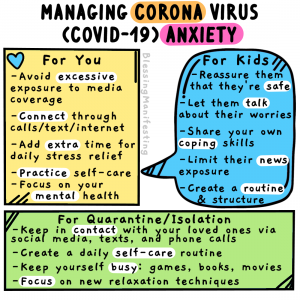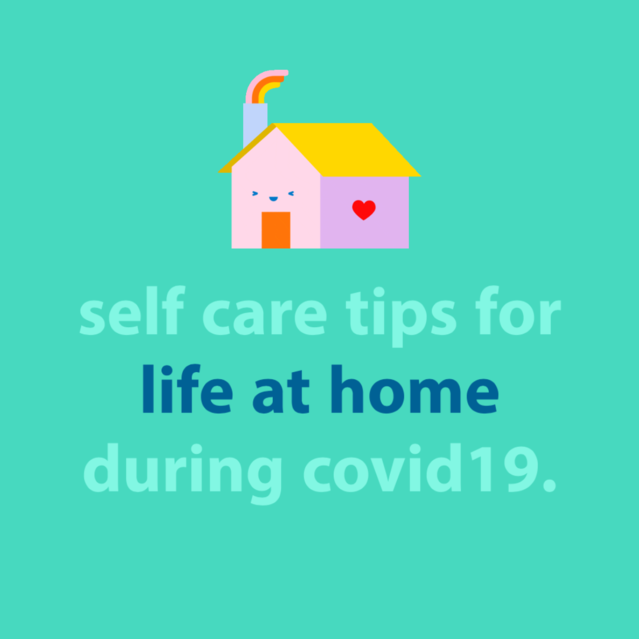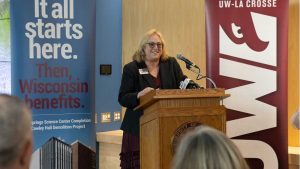Prioritizing mental health during COVID-19 outbreak
April 24, 2020
“We recognize that this is an uncertain and anxiety-provoking time for many,” states the University of Wisconsin-La Crosse’s Counseling and Testing service’s Self-Care During COVID-19 guide. “While COVID-19 impacts each of us differently, it is impacting each of us.”
The recent outbreak of COVID-19 which has led to Wisconsin Gov. Tony Evers’s “Safer at Home” order may leave members of the UWL community feeling different emotions during self-isolation and the transition of courses online.
“It’s important to prioritize your mental health all of the time, but especially right now because things are so different. Our new normal is so different from what our lives looked like before,” said counselor at the Counseling and Testing Center, Kelly Ehleiter.
There are different methods individuals can use to cope with stress while respecting social distancing. The Centers for Disease Control and Prevention recommends taking breaks from watching, reading, or listening to news stories, taking care of your body, making time to unwind, and connecting with others. UWL’s Self-Care guide also lists many different ways students can relax and focus on prioritizing their mental health.
“Watch your screen time. Watch the amount of time you are putting into social media and the news. Do what feels good and then learn to turn it off,” said Ehleiter. “Try and be active, do what you can. Really try and get sunshine and fresh air.”

In regards to physical activity, Ehleiter said, “Normally if you were walking to and from class that may take ten minutes. So, since we aren’t on campus, take ten or so minutes in the middle of your day to get up and stretch, get outside, or get some fresh air.”
UWL sophomore, Sydney MacDonald stated in order to relax and get out of the house she goes on drives, listens to music, and does her best to stay active.
“I’ve actually gotten a lot more active. I used to just lay around a lot, but now I’ve gone on some runs and a few bike rides,” said MacDonald. “I try to get outside when I can and just get fresh air.”
MacDonald stated while she feels like she is handling the transition to online schooling well, the hardest part for her has been creating a schedule and falling into a routine.
“I think it is a lot harder to establish a routine now because there isn’t a lot of structure,” said MacDonald. “It’s going alright. I really like that I can get things done faster, but I wish things were more structured.”
Ehleiter suggested creating a schedule and following a routine that includes time dedicated to self-care to create a sense of normalcy and cope with stress.
“It could be as simple as even going to bed and waking up at the same time. Especially with online classes, try to create a routine as if you were on campus, having work time, and then free time,” said Ehleiter. “It is super challenging right now because there is so much opportunity for there not to be a schedule and everything blurs into one really long day. At the end of the day, self-care is really just as important as getting a paper done.”
Reaching out and staying connected with friends, family, and your resources is also another important step in the process of coping with self-isolation.
“Reach out to your special people, I cannot stress that enough,” said Ehleiter. “It is so important to stay connected. Allow yourself to have fun and maintain your connections.”
Ehleiter stated self-care has different faces and not everyone’s version will look the same.
“Self-care can totally be face masks and ice cream, but it is also stuff like writing down all of your assignments in a planner, making your bed, and doing your laundry,” said Ehleiter. “Just know some days you may be a rockstar at self-care and some days you might be left wanting, and that is okay – it is all about balance.”
Ehleiter, and the Self-Care guide, stress the importance of practicing self-compassion amid this situation, being gentle with yourself, and accepting and validating the emotions you are feeling.
“Our brains want to tell us right now, ‘You only have time, so invest everything you have into school,’ and that’s just not realistic or fair to ourselves because a lot of other things in our lives are important,” said Ehleiter. “We are only human, there are going to be moments of success academically and there are going to be moments when you didn’t do as well as you wanted and that’s okay.”

“It’s okay to feel whatever you are feeling right now. Validating ourselves is really important, so there [may] be days when we are feeling really good and that is okay,” said Ehleiter. “There [may] be days when we are feeling more anxiety, sadness, or anger and acknowledging that those are important reactions to be having is important too.”
For anyone needing resources, counseling, or academic help, the UWL Counseling and Testing Center is continuing to offer virtual services.
“We still offer most of the services that we can. Ultimately we are still able to provide crisis services over the phone Monday through Friday,” said Ehleiter. “We have someone who is on call all day checking the phone line and able to respond back. It is a great crisis resource for people who are still in the La Crosse area or not.”
“We also recognize some people might not have safe spaces right now, so if that is the case, please reach out to us or any resources you have,” said Ehleiter. “It is okay to advocate for yourself and get yourself into a space that is safe for you.”
According to Mental Health America, the mental health effects of COVID-19 are just as important to address as the physical health effects.
“It’s okay to feel what we are feeling, and it is okay to have reactions to those feelings,” said Ehleiter. “It’s stressful and sometimes we can only be so flexible, so that’s when adding in coping mechanisms, and self-care, and staying in contact with our loved ones is so important because of how different life looks now.”
As the Self-Care guide states, “Take care of yourselves, take care of each other, and we will get through this together.”
For more information and resources visit, https://www.uwlax.edu/counseling-testing/. To view UWL’s Self-Care guide visit, https://www.uwlax.edu/globalassets/offices-services/counseling/self-care-during-covid-19.pdf.






